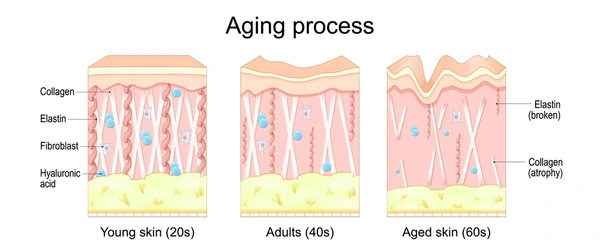Staying active doesn’t just help you feel better. Studies have shown that regular exercise can increase life expectancy by up to seven years.
That makes movement one of the most powerful anti-aging tools we have to stay energized and boost our overall quality of life. Exercise reduces the risk of disease while supporting our everyday processes and cellular function so we can age better, live better, and show up more fully in our everyday moments. (1)
Cellular Health, NAD+, and Aging
As we age, our cells naturally lose their ability to move through normal processes. Exercise acts as a tune-up for healthy cellular function and can prevent age-related decline that accompanies malfunctioning cells.
Our cells rely on mitochondria to produce quality energy in order to power the rest of your body. Exercise enhances mitochondrial function by increasing the number count and quality of production in the cell. (2)
Similarly, exercise stimulates the cellular cleanup processes and reduces inactive cells lingering in the body that have been linked to certain age-related conditions. (3)
NAD+, a key player in cellular energy production, sees increased turnover in response to higher energy demands from the muscles. Given the other vital roles NAD+ plays in the body, a steady stream of production supports DNA repair while reducing oxidative stress. (4)
This boost in cellular performance increases the availability of quality energy and enhances overall metabolic function, both of which are important for long-term health.
The Cardiovascular Key to Longevity
The cardiovascular system (CVS) pumps nutrient-rich blood throughout the body, supporting organ function, delivering oxygen, and removing waste. Keeping a healthy heart is essential to combating the natural decline of cardiovascular function.
Exercise works to strengthen the heart muscle, improving circulation and blood pressure. Increased efficiency of the CVS allows the heart to pump blood more effectively with less strain. Just 40 minutes of moderate movement 3 to 4 times a week can prevent cardiovascular disease and lower the risk of heart attacks and stroke. (5)
Together, these benefits support the idea that daily movement is a great way to slow the effects of aging while promoting heart health.
Metabolism and Insulin Sensitivity
Our metabolic rates naturally slow over time, affecting our ability to maintain a healthy weight and energy levels.
Exercise helps your body use and store energy more efficiently. It encourages muscles to use glucose (sugar) for fuel and enhances insulin sensitivity, which improves how your body processes blood sugar.
By regulating the glucose metabolism, the body minimizes how much excess energy is stored as fat, which in turn helps regulate body weight and lowers the risk of obesity. (6)
Brain Health
Aging can bring a handful of challenges for brain health, including a higher risk of neurodegenerative diseases like Alzheimer’s and Parkinson’s. As we get older, it becomes even more important to support and protect cognitive function.
Studies show exercise is one of the most effective ways you can protect your cognitive function, promoting the growth of new brain cells (7) and increasing the flow of oxygen-rich blood to the brain. (8) This enhanced blood flow has been shown to improve short and long-term memory. (9)
Physical activity also boosts the production of neurochemicals like BDNF that reduce oxidative stress and neuroinflammation, protecting your brain cells from damage. (10) Dopamine, serotonin, and endorphins, the “feel good” neurochemicals produced during exercise, work to reduce stress and improve your mood. (11)
Engaging in physical activity can improve and preserve your brain, ensuring long-term cognitive and mental health.
Functional Health
Physical Foundation
Changes to the physical body are one of the best benefits of regular exercise. You build muscle strength and support bone density, creating a stronger foundation for your everyday tasks. This increased overall physical health reduces the risk of injury while improving everyday performance and mobility. (12)
Immune System
Exercise fights off inflammation, improving your immune system by increasing anti-inflammatory proteins. This also increases the circulation of immune cells throughout the body, enhancing the ability to detect and combat harmful pathogens. Basically, it helps build a stronger and more responsive immune system. (13)
Sleep Quality
Studies show that exercise done earlier in the day helps regulate your circadian rhythm, promoting consistent wake-sleep cycles. (14) Stress and sleep hormones like cortisol and melatonin also see an increased balance as a result of regular exercise, creating longer, more restful sleep periods.(15)
These effects make it easier to fall asleep at night and wake up in the morning feeling refreshed, generally supporting the quality of your sleep and your day.
How to Make Exercise A Part of Your Daily Life
Building a sustainable fitness routine is key to achieving your long-term health goals. To find consistency:
- Choose an activity you truly enjoy to stay motivated and engaged.
- Plan ahead and commit to a weekly exercise schedule.
- Vary your routine to stay interested and challenge your body.
- If you're new to exercise, ease in to give your body time to adapt.
- Move with others that motivate and encourage your growth
Living Longer Through Movement
The connection between longevity and exercise is clear; movement is essential for your long-term health. Exercise strengthens your heart, supports your brain, and helps maintain cellular foundation, all of which determine your overall quality of life.
Being able reduce the risk of disease, enhance cell and metabolic function, and improve overall well-being make physical activity essential to living a longer, healthier life.






